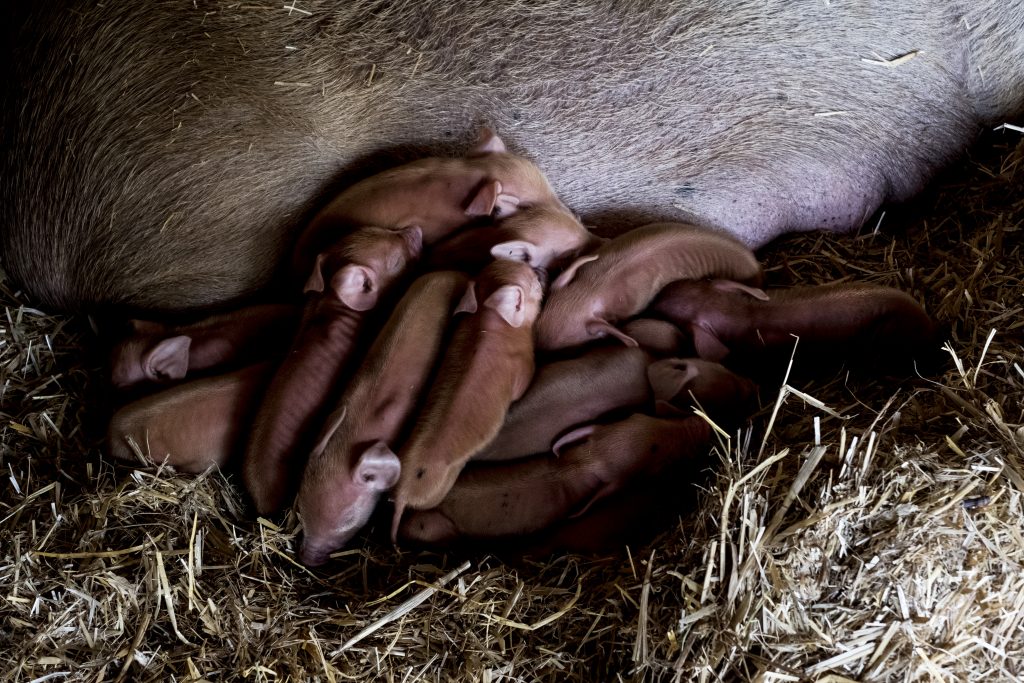29 Mar Feed your sows for optimum colostrum quality

WHY COLOSTRUM IS SO IMPORTANT?
Colostrum is a form of milk produced by the mammary glands of mammals during a short period before and after giving birth (up to 24-48 h after birth in the case of the sow).
An immediate and sufficient intake of colostrum (more than 200 grams/piglet, Devillers et al, 2011) determines the health and livability of piglets during the pre-weaning period.
Colostrum,
- Is rich in energy, the energy needed to maintain piglet metabolism and temperature.
- Contains up to 38% of proteins, most of them immunoglobulins and other proteins related to the transmission of passive immunity from sow to piglet. Colostrum is closely related to the resistance of the piglet to infections.
- Is rich in many vitamins and trace elements (Aumaitre and Seve, 1978).
- Plays an important role for the proper development of the gastrointestinal tract of the piglet (Xu et al, 2002).
PREPARING FOR THE MILK PRODUCTION
Mammary development occurs during prepuberty, puberty and gestation of the sows and continues during lactation (Farmer et al, 2004; Ji et al, 2005; Ji et al, 2006). Therefore, the capacity to produce sufficient amount and quality of milk is affected by the nutrition, endocrine status and management of gilts or sows during these periods.
During the final 2 weeks of gestation, the onset of lactogenesis (synthesis of elements related to colostrum and milk) occurs. As a result, we observe the development of the udder, which becomes firmer and more distended.
FACTORS THAT AFFECT COLOSTRUMS YIELD
Colostrum yield varies a lot between sows. It is not affected by litter size but can be influenced by several other factors ( Eliasson and Isberg, 2011):
- Parity number: there is a higher production in second- and third-parity sows than in primiparous or older sows (Devillers et al, 2007).
- Age of the sow: the variety of immunoglobulins in colostrum is related to the antigens that the sow has been exposed to. As a consequence, older sows offer more disease protection to their piglets than younger ones, because they have been exposed to more diseases.
- Weight of the sow at parturition: overfeeding in gestation has a negative impact on mammary development due to excessive fat accumulation.
- Sow health
- Genotype of the sow.
- Piglet birth weight: piglets with a higher weight are more efficient stimulating the udder and colostrum yield is higher (Devillers et al., 2007).
- Sow nutrition
INFLUENCE OF SOW NUTRITION
During late gestation, lactogenesis starts and fetal weight gain increases substantially, so nutrient requirements of the sows increase. However, it is not good to overfeed the sows because overfeeding in this period seems to decrease feed intake and reproductive performance during lactation.
Fatty acids
The fatty acid composition of colostrum is affected by the level and composition of the dietary fat (Christon et al, 1999).
Long chain polyunsaturated fatty acids (PUFA) are important for the development of certain organs such as brain, nervous system, tissues related to immune system and muscle. Including certain oils rich in PUFA (fish oil, marine oil or certain vegetable oils) in sow’s diet has been proved to modify fatty acid composition of colostrums and, ultimately, exert a positive influence on the health and growth of the piglet (Sampels et al, 2010).
Besides, feeding PUFA to the sows has been proved to increase the concentration of immunoglobulins in colostrum, offering extra immune protection to the piglets (Rossi et al, 2004).
Protein
Colostrum composition is not affected by the dietary percentage of crude protein, but feeding more lysine in late gestation increases the protein content and dry matter in colostrum. (Heo et al, 2008).
Fiber
A diet rich in fiber does not enhance colostrums yield, but it increases tits lipid fraction and seems to stimulate colostrum intake of weak piglets (Loisel et al, 2013).
Vitamins
Newborn piglets depend on the vitamins transferred from the sow via colostrum. It is possible to increase vitamins A and E in colostrum by increasing the dose in feed or by administering injections to the sow at day 100th and day 107th of pregnancy.
Prebiotics
Researchers showed that feeding prebiotics such as inulin to the sow improved the quality of colostrum and contributed to a better development of the small intestine of piglets (Awad et al, 2013).
The most likely mechanism of action of inulin is through the stimulation of the growth of beneficial bacteria in the intestinal flora, which in turn stimulate the immune system and antibody production.
Phyto-active ingredients
Trials with certain phyto-active ingredients show that they may stimulate the immune system of the sow and increase the amount of IgG and IgA in colostrum.
Feeding other plant extracts to the sow, like cinnamon, increases the concentration of lactose in sow colostrum, making it richer in energy and preventing hypogycaemia in piglets.
OTHER TIPS TO OPTIMIZE COLOSTRUM PRODUCTION
- Pay attention to the selection, immune status, nutrition and management of replacement gilts.
- Have a complete vaccination program for the sow, taking in account in many cases antibodies will be transmitted from sow to piglet and will protect the litter.
- Reduce stress before, during and after farrowing.
- Ensure sows have unrestricted access to fresh drinking water.
- After farrowing, make sure all the piglets have a functional teat and they had colostrum.
- Ensure an intake of at least 100 ml colostrum 16 h post-farrowing (a piglet feeds 7 times).
Products of choice
ReproPlus© is a premix powder intended to maintain and improve digestive health in pregnant and lactating sows. It is formulated with synergistic ingredients:
- Bactericidal and fungicidal phytogenics, combined with organic acids.
- Phytogenics with immune boosting and antioxidant activity.
- Plant extracts with prebiotic effect.
- Vegetable oils rich in omega 3.
- Silicates with mycotoxin binding function.
When administered during the last period of gestation, it has a positive impact on the survivability and the health of the litter.
PlusBind© is a mixture of carefully selected silicates intended for the prevention of diseases and productivity losses related to the presence of all types of mycotoxins. It is indicated in poultry, pigs, aquaculture and ruminants.
The silicates present in PlusBind© have a highly expandable molecular structure. This characteristic gives the product a wide surface available for the adsorption of mycotoxins and therefore allows a high effectiveness at lower doses (0.5-1 kg per ton of feed).
PlusBind Bio© is a mixture of carefully selected silicates intended for the prevention of diseases and productivity losses related to the presence of all types of mycotoxins. It also contains plant extracts with prebiotic effect.
It is indicated in poultry, pigs and aquaculture.
The silicates present in PlusBind Bio© have a highly expandable molecular structure. This characteristic gives the product a wide surface available for the adsorption of mycotoxins and therefore allows a high effectiveness at lower doses (0.5-1 kg per ton of feed).

Certain health statements may not be applicable in your region.

